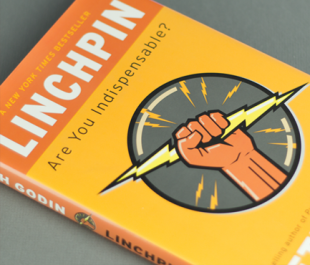Books We Read: Linchpin Part 2


Each week, OpenSesame employees and interns come together as a company to read Seth Godin’s Linchpin: Are You Indispensable? Godin describes a linchpin as “the essential element, the person who holds part of the operation together. Without the linchpin, things fall apart.” In our second week of Linchpin, we discussed “Chapter 4: Indoctrination-- How we got here” and “Chapter 5: Becoming The Linchpin.”
In chapter 4, Godin describes how a hundred years ago leaders worried about finding factory workers and avoiding overproduction. Today, because of universal education, there are many “factory workers” and we have created a consumption society in which people always need more; it is a perpetuating cycle. Seth argues schools are places run like factories to produce workers who are docile and follow instructions.
Our discussion at OpenSesame leaned more towards understanding and analysing how educational experiences have shaped us. Some key takeaways from the discussion are:
- Education institutions today have structure and rules which are necessary to help us gain some structure in our thinking.
- Schools are knowledge centers full of opportunity to meet other people, implement ideas and challenge our thinking.
- What you take away from school depends more on your interests and passion, rather than your teachers or school. For example, Kate Cornelius, lead intern at OpenSesame, while agreeing her school made “factory workers,” was able to make her own opportunities to be a leader, take on new roles, and learn new things.
- In developing countries, education systems are still evolving. Schools are more focused towards helping students gain skills that can help them find jobs.
The chapter on becoming the Linchpin speaks about emotional labor. The term ‘emotional labor’ was coined by sociologist Arlie Hochschild. She described it as “management of feelings to create a publicly observable facial and bodily display... sold for a wage.” The term can be applied to many professions from baristas to managers. Godin says the most difficult type of emotional labor is staring into the abyss of choice and picking a path. Emotional labor is an interesting concept. A linchpin contributes emotional labor at work in his interactions with people. Godin also talks about Marissa Mayer, Donald Bradman, and Bob Dylan, linchpins in their respective fields. He urges the reader to bring his or her genius self to work everyday and not just follow instructions.
Being a great employee is not just about following instructions, it is much more than that. Seth Godin challenges the reader to be a linchpin by thinking unconventionally, breaking the rules, and contributing emotional labor at work. Discover what you are good at, master it, and market that skill in the marketplace at a premium and stand out. Be different-- it’s okay to not conform to rules.
Photo from sethgodin.com



